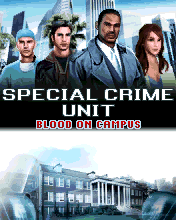
They don't make TV detectives like they used to. Remember the times when solving murders on the telly was about primping your moustache and getting uppity when mistaken for a Frenchman (Poirot); comparing suspects to people who used to live in your village (Miss Marple); and banging on endlessly about your wife until the weeping murderer gives themself up (Columbo)?
Hell, those were the days when you didn't even have to be a detective to solve murders (Quincy, Murder She Wrote's Jessica Fletcher).
Nowadays, of course, things have changed. You have to be a specialist to catch killers today, using the latest forensic technology. Just look at CSI and its numerous spin-offs.
Gameloft's new mobile game definitely takes inspiration from the latter school of telly detection. Special Crime Unit: Blood on Campus takes CSI as its starting point, serving up a neat accuse-'em-up that blends forensic investigation with hard-boiled interrogation.
You're a fresh member of the eponymous Special Crime Unit, tasked with investigating the death of a young female student – Shirley Mine – who's been found partially undressed, strangled and severely beaten (the game's release this week is unfortunate timing, to say the least, given terrible recent events in Ipswich).
The gameplay revolves around searching locations for evidence, analysing that evidence back in the police lab, and then questioning suspects using your findings as a starting point for questions. The cast of characters includes Shirley's boyfriend, ex-boyfriend, and college lecturer (that's three separate people, obviously), as well as the manager of the hotel she was found in, and her boyfriend's sister.
It's neatly put together. When searching locations, you're represented on-screen by a floating hand. When it moves over an interesting object, the object flashes, and you can choose which tool to examine it with, from a gradually-increasing list that includes tweezers, a swab, magnetic tape, a UV lamp and a fingerprint collecting kit.
Once you've got a bunch of evidence, you head back to the lab, where you analyse it via some ultra-simple mini-games – for example, having a few seconds to see if two fingerprints or dust samples match. Whenever you uncover a piece of information, it's added to your files, which can be consulted at any time.
Finally, the interrogations basically involve a list of questions, which you can ask in any order you like. New questions are added as you discover more information and evidence, so you'll end up coming back often to re-question suspects.
A nice touch is the lie detector at the top of the screen, which jerks about when they're telling porkies, allowing you to quickly bark "You're hiding something!" and get to the real story. Although it's so easy to tell when you need to pile this pressure on, it's not exactly a challenge.
Special Crime Unit is a good game, but not a cast-iron classic. You will want to keep playing to figure out who the killer is, and there are some suitably unexpected twists along the way.
The problem is that playing sometimes feels like a chore, with you traipsing back and forth between the lab, the police station and the locations to search, laboriously sweeping for clues and then playing the same mini-games to make sense of them.
The concept is strong enough to make you put up with these foibles, and you could argue that the game is merely accurately replicating the slog of real-life detection. But it sometimes makes for repetitive gameplay.
Even so, Special Crime Unit is still well worth the price of a mobile game, even if once completed you never feel the urge to play through it again. It's a solid and playable attempt to create a new mobile genre, and will appeal hugely to any fans of CSI and its ilk.
We'd still like to see Gameloft have a crack at the Miss Marple licence, mind.
Special Crime Unit: Blood on Campus

